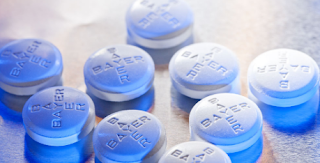What is an Aspirin Mask?
The most common recipe for the aspirin mask is as follows:
Crush 3 tablets of uncoated aspirin in a tablespoon of water
to make a paste. Spread over a clean face, let sit for ten minutes, and gently
rinse off. Do this no more than once a week.
How is it effective?
Aspirin is acetylsalicylic acid. If you have researched any
acne products in the past or looked through the offerings of the drugstore you
may find something familiar in that name. Salicylic acid, along with benzoyl
peroxide, are the two most common active ingredients found in over the counter
acne treatments. Acetylsalicylic acid and salicylic acid share similar chemical
properties.
Why is it a bad idea?
It is amazing how many discussions about the aspirin mask
can be found on a variety of beauty and skin care forums. I frankly do not
understand why people are bothering with this home remedy. I would think that
if you wanted to use a home remedy for acne, it would be to use natural, gentle
ingredients on your skin and not submit your skin to any harsh chemicals or
unfamiliar, unnecessary ingredients.
But that is exactly what an aspirin mask is. Aspirin pills
contain binders as well as a large amount of acetylsalicylic acid, and the
effect can be way more intense than anything you put on your skin should be.
This obviously shouldn't even be a consideration for anyone
with a known allergy or sensitivity to aspirin. But it is also possible that
applying the aspirin to your skin could lead you to finding a sensitivity you
were not aware of. I have read many users mention feeling a little lightheaded
while using the remedy, but that the feeling goes away. I do not understand how
this is not a concern for these people. It is unknown at this time how much
aspirin can be absorbed into the skin, but some users have reported
experiencing the same reactions to the aspirin they put on their skin as when
taking the same amount orally.
This home remedy is very unlike other old trusted
approaches, such as the use of honey or diluted tea tree oil on the skin. If
your skin has responded well to the acetylsalicylic acid, it is highly likely
that it would also respond well to a number of affordable products available at
the drugstore. If the inactive ingredients list is not to your liking, salicylic
acid can also be found in a number of natural and organic acne treatments as
well.
Ideally, your skin care products should be pH balanced and
intended for use on skin. The movement towards recipes for homemade products
has begun to worry me as I see some ingredients that are very inappropriate for
skin, especially any skin that is sensitive and prone to a skin condition, such
as acne or rosacea.
Manufacturers of skin care products go through a
considerable amount of product testing to ensure consumers will not experience
negative reactions. It is unsettling that so many people are using their homes
as laboratories and themselves as laboratory rats with such a powerful
ingredient.
A final major concern: because the aspirin mask is mostly
intended for acne sufferers, pre-teens and teenagers are likely going to be
interested in this remedy. I have come across some recipes that call for up to
eight aspirin tablets. If the child were to come across such a recipe, they
could very well end up in the hospital later that day.
What can be done about acne then?
If you are experiencing regular, painful breakouts, then
that would be considered a case of such bad acne that requires an appointment
with a dermatologist, or at least a treatment plan that has been well
researched and is intended for your level of acne. Otherwise, if your concern
is simply how to get rid of pimples because you woke up with a few on your face
this morning, then there are a number of spot treatments available at your
drugstore that can clear that up quickly and safely.
Article Source:
http://EzineArticles.com/expert/Willow_Torres/831144
Article Source: http://EzineArticles.com/5381199



EmoticonEmoticon